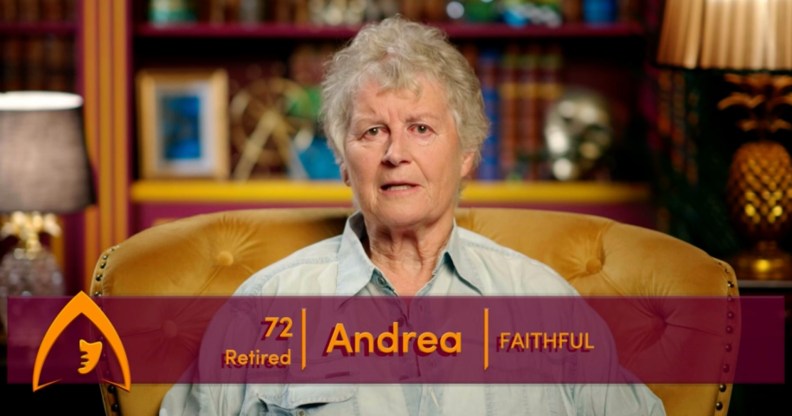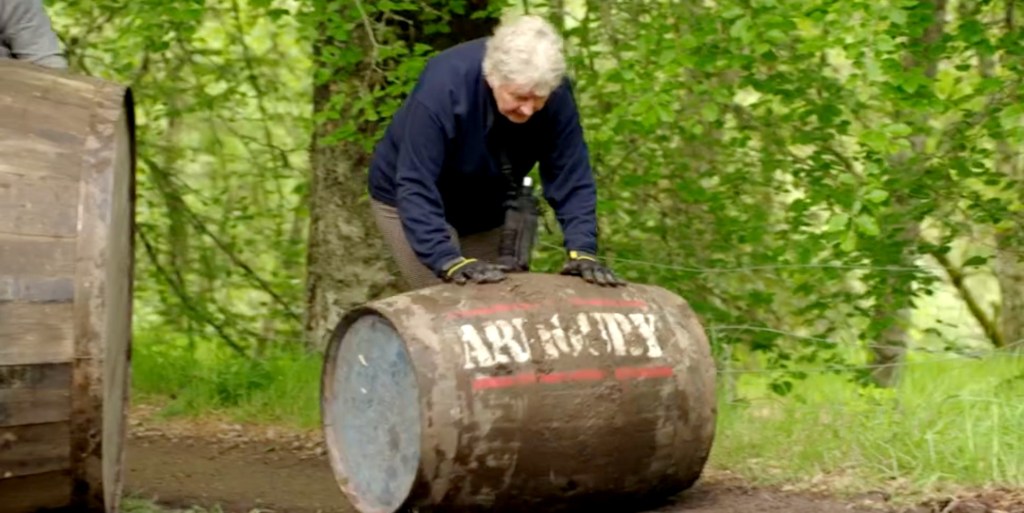Charities praise older LGBTQ+ representation on The Traitors: ‘This community isn’t being heard’

Andrea on The Traitors. (Credit: BBC)
Charities have praised BBC’s The Traitors for positive representation of older LGBTQ+ people, after contestant Andrea spoke about her late partner on the show.
During Tuesday’s (13 December) episode the 72-year-old, who’s a “Faithful” in the reality TV game show, explained how much she had enjoyed the teamwork on the show, especially given the loss of her partner.
“I live alone. And coming back is like being at school and being with friends,” said Andrea.
“My partner died. We spent 26 years together. She was a wonderful woman. I came out of that saying, ‘I’m a fighter.’”
Andrea’s one of 22 contestants on the BBC show, which has become a huge hit, competing for a prize of up to £120,000 in a Scottish castle, but where several unknown “Traitors” try to eliminate others to claim the money for themselves.
“One of the revelations for me being here is to say I really love these people. It’s lovely being able to feel that at my age,” Andrea added.

Christina DaCosta, senior director of marketing and communications at Sage, tells PinkNews that Andrea’s presence on The Traitors is important to show “LGBTQ+ people exist and are completely themselves”.
“Older people have sex lives. Older people have love. Older people have loss,” DaCosta added.
Sage is an organisation that offers advocacy and services for LGBTQ+ elders.
Its motto – “we refuse to be invisible” – highlights the “double whammy of ageism” within the LGBTQ+ community and society in the hope of removing it.
DaCosta added that many older queer people are forced to hide their authentic selves.
“Sharing their stories, truthfully, is a way to not only educate people on the hardships this population has, but also their perseverance and strength,” she said.
Seeing such representation on screens will help give the older community power to “live their authentic lives, and inspire others to do so”, she said.
Despite an increase in queer representation on screens in recent years, DaCosta said older queer representation “is sadly lacking” when compared to featuring younger members of the community.
‘The media should share these stories’
In order to create more inclusive TV content DaCosta recommends media professionals “dig into LGBTQ+ history, while respecting the present and thinking about the future”.
“Recognise that this population has been breaking ground for centuries,” she says.
“They’ve been coming out and facing the consequences; they led the protests that fuelled the movement, they have survived both the AIDS epidemic and COVID, they have cared for and developed families of choice and they have amazing stories to share.
“The media should share these stories year-round, not just during Pride.”

Head of fundraising and communications at Opening Doors, Jonathan Buckerfield, echoed DaCosta’s views, and described older LGBTQ+ representation in today’s media as “almost non-existent”.
Buckerfield noted mainstream society seems not to want to “see” or “hear” older generations, despite everyone getting older – and being lucky to do so.
However, he said the community has huge amounts of experience and wisdom to share, and their stories “need to be documented and celebrated” where everyone can reach.
“Having Andrea open up about her life experiences and those of her partner helps to challenge negative perceptions around ageing, as well as being queer,” Buckerfield tells PinkNews.
“In turn, this will help pave the way for others looking to talk openly about their sexuality.”
An increase in LGBTQ+ representation on TV also offers a chance for young queer people to learn from the challenges faced by the older generations, he added.
“There is not enough older queer representation on TV at the minute. There are stories told by older LGBTQ+ celebrities, but in reality, the experiences of other people in this community isn’t being heard.
“We need to hear more from queer people with different backgrounds and mindsets, both from the people themselves, as well as through well-built characters representing their lives.”
Buckerfield suggested people in media need to “move beyond the status quo, diversifying their stories to get more older people from the LGBTQ+ community on our screens”.
“The Diversity Standards Collective is doing some amazing work around improving diversity within the media.
“It’s ensuring people from those communities are part of the production process, which in turn helps to provide a more authentic portrayal of the experiences lived by older LGBTQ+ generations.”
The Traitors continues on BBC One and iPlayer.

